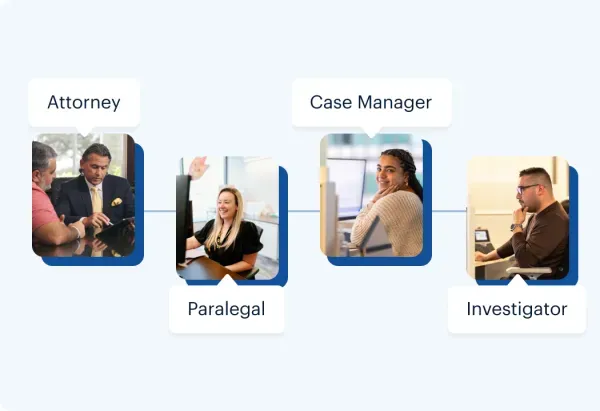Results may vary depending on your particular facts and legal circumstances. The attorney featured above is licensed in Florida. For a full list of attorneys in your state please visit our attorney page.
Results may vary depending on your particular facts and legal circumstances. The attorney featured above is licensed in Florida. For a full list of attorneys in your state please visit our attorney page.
Sinkhole Injury Lawyer in Tampa
Mariners that navigate the Gulf of Mexico for commercial or recreational reasons refer to a weather phenomenon called The Perfect Storm. A combination of meteorological factors converges to produce high winds, heavy rain, and the roughest sea possible.
In the world of geology, the perfect storm for the formation of sinkholes is located in and around the greater Tampa Bay–St. Petersburg metro area.
Hillsborough County ranks third for the number of sinkholes in the State of Florida, while Pinellas County comes in fifth place. Tampa sinkholes have become prevalent enough for real estate attorneys to get involved in the disputes commercial and residential property owners engage in with their insurance companies.
Have you noticed damage to your property that might be linked to the formation of a sinkhole? The warning signs of cracks in the steps, walls, and foundation can indicate the start of a serious structural problem. To recover the money lost because of the damage caused by a sinkhole, you must demonstrate the presence of a sinkhole, and then link it to the damage done to your home or business.
Florida real estate law requires every insurance company that has a license to operate in the Sunshine State to cover the damage caused by sinkholes. However, just because the law requires insurance companies to cover the costs of repairing property damage does not mean all insurance companies comply. Insurance companies send out investigators to determine whether the damage done to a structure and/or a parcel of land came from a source other than a sinkhole.
If your home or business has suffered damage by what you consider to be a sinkhole, you should contact a Florida-licensed real estate attorney to file the most persuasive insurance claim. At Morgan & Morgan, we help clients resolve their Tampa sinkhole issues by ensuring insurance companies hold up their end of the law when it comes to paying sinkhole claims.
Schedule a free case evaluation today to learn more about how our team of real estate lawyers can help you file a successful insurance claim.
100,000+ Five Star Reviews
The reasons why clients trust Morgan & Morgan.
Results may vary depending on your particular facts and legal circumstances. Based on select nationwide reviews.
Our Results
How It Works
Unsure what to do next? With 35 years of experience, our personal
injury lawyers will guide you every step of the way.

Contact Us 24/7 - It’s Free
Start your claim

Meet your dedicated attorney
Meet the attorneys

We fight for more
Learn more about the case process
Results may vary depending on your particular facts and legal circumstances. The attorneys shown in these photos may not be licensed in your state. To find an attorney licensed in your area, please visit our attorney page.
Local Care
Backed by America’s Largest Injury Law Firm.
$30 Billion
Recovered for clients
nationwide700,000+
Clients and families
served1,000+
Attorneys across
the country1
Click may change your life
The attorney featured above is licensed in Florida. For a full list of attorneys in your state please visit our attorney page.
Results may vary depending on your particular facts and legal circumstances.
Learn More
Injured and not sure what to do next?
We'll guide you through everything you need to know.
What Are the Types of Sinkholes?
When you sit down with one of our experienced real estate attorneys, one of the first items on our to-do list is to determine what type of sinkhole is wreaking havoc on your property. Three types of Tampa sinkholes plague residential and commercial property owners.
Solution Sinkhole
This type of sinkhole develops in areas where exposed limestone at the surface starts a gradual downward motion. Limestone covered by thin layers of sand and/or soil is also vulnerable to shifting downward. As the rock moves downward, the development of a depression captures an increasing amount of water runoff.
Cover Collapse Sinkhole
A solution cavity develops in limestone to grow to a size that the limestone can no longer support its weight. This type of sinkhole collapses suddenly and quickly, with the result often devastating.
Cover Subsidence Sinkhole
The cover material over limestone is unstable, which pushes grains of sand downward to replace grains of sand that have moved further into the ground. Eventually, the dissolved limestone can no longer support its weight and it begins a slow descent to form a large hole.
How Long Does It Take for a Sinkhole to Stop Moving Downward?
When a cavity in the ground grows to the point that it cannot support the weight of the sediment above, the dirt and other types of debris collapse into the cavity. After the sediment collapses, the cavity can grow for another few hours or days depending on the size and depth of the sinkhole. Heavy rain, which is a common event along the Gulf Coast, can fill a cavity relatively quickly. A depression shaped like a bowl develops at the surface, which can take years or even decades to complete its formation.
Can I Repair a Tampa Sinkhole?
Florida is home to millions of underground cavities that form because of soil erosion. The result can be significant property damage to homes and the central Florida transportation infrastructure. Water contamination also is a major issue for residents and businesses. Because of denied insurance claims, many property owners have tried to repair sinkholes on their own.
The likelihood of you fixing a Tampa sinkhole depends on several factors. Size, depth, and soil moisture content all play a role in determining the success of a sinkhole repair project. You might be able to fill a sinkhole with soil, but the do-it-yourself project can jeopardize your safety if you do not test the stability of the replacement soil.
You should consider getting help from a landscaper or an engineering firm. For a complex sinkhole repair project, a company dedicated to repairing ground cavities might be your best option.
What Are the Sinkhole Repair Issues?
Although your insurance company might agree to pay for the damage caused by a sinkhole, the amount of money offered by your insurer might fall well below the total cost of the repair project. A lowball offer by your insurance company means you might have to pay a considerable amount of out-of-pocket expenses. If you cannot afford to make up the difference between what your insurer offers and the total cost of the repair project, you cannot expect to complete the repairs necessary to stabilize your home or business.
For example, your insurance company might agree to pay for the least costly repairs. If your insurer verifies the presence of a Tampa sinkhole, the company asks for repair estimates from contractors located in the area. Many sinkhole repair contractors suggest pumping grout into the ground as the only method for repairing the sinkhole. If your insurance company takes the lowest repair bid, you might have to cover the remaining cost of funding the Tampa sinkhole repair project.
The issue with pumping grout into the ground is there is no way to accurately calculate the amount of grout that is needed to complete the project. If the grout pumping process requires more grout than predicted and/or it takes more time than scheduled, then you might have to cover the remaining costs required to complete the sinkhole repair project.
Working closely with the team of real estate attorneys at Morgan & Morgan can help you prevent sinkhole repair issues. We will hold your insurer responsible for covering all the costs of the project, including any costs that arise after the winning contractor submits an estimate.
Does Florida Have a Database Showing the Location of Sinkholes?
The State of Florida does not maintain a database that shows the location of sinkholes. However, the Florida Geological Survey keeps a database of reported subsidence events. Although subsidence events create the most sinkholes in the Sunshine State, they do not create all of them. Just because the Florida Geological Survey does not list a reported sinkhole on or near your property does not mean one does not exist.
Hiring an engineering firm to conduct a geological survey of your property represents the most effective way to learn whether you have a Tampa sinkhole problem.
What Is a Subsidence Event Report?
Sinkholes represent closed depressions underground covered by limestone and sometimes dolostone. Sediment moves downward onto voids that develop because groundwater dissolves the rocks. Other types of events can cause holes or depressions of a land surface that reflect the characteristics of a sinkhole, but it is not defined as a sinkhole. Some of the reasons for this geological activity include the decomposition of tree stumps, a collapsed drain pipe, and a broken down septic tank that sinks into the ground.
If a properly credentialed engineer or geologist does not confirm the presence of a sinkhole, then the cause of the depression is listed in a report as “not known.” An unknown depression is referred to as a subsidence event. An insurance company that receives a subsidence event report can deny a property owner’s claim for coverage.
How Do I Get My Property Evaluated?
A team of properly credentialed geologists or an engineering consultant with geologists on payroll can conduct several different tests to determine whether your property is susceptible to the development of a Tampa sinkhole. Tests can include radar signals that penetrate the ground, as well as an electrical resistivity survey. Local geology characteristics and the elevation of the water table can impact test results, which might result in an inconclusive analysis.
A comprehensive survey conducted by a Florida sinkhole company is typically not affordable for the average homeowner's budget.
Does Florida Have a Sinkhole Disclosure Law?
Florida law requires the seller of property to disclose to a buyer that the property had a sinkhole claim covered by an insurance company. The seller also must disclose whether any of the insurance claim money paid for repairs to the damage. Florida legislators often modify statutes, which means you should refer to a Morgan & Morgan real estate attorney to learn about the current laws covering sinkhole disclosure.
Most real estate seller disclosure forms include a section for a sinkhole disclosure statement.
How Do I Report a Tampa Sinkhole?
Tampa residents should report a sinkhole to the Hillsborough County Public Works Department. You can submit the online form or call the Public Works Department at 813-635-5400. Calling the department might lead to a quicker resolution of your sinkhole report than if you submit the online form.
Make sure to report the location of the sinkhole, as well as if it appears to pose imminent danger. For example, a sinkhole discovered on a road or highway is considered an emergency incident.
Schedule a Free Case Evaluation With Morgan & Morgan
Working with a team of highly skilled real estate lawyers can help you resolve a sinkhole claim filed with your insurance company. We will help you submit the claim, as well as appeal a denial decision made by your insurer. Our team of real estate attorneys works hard to get you the money you deserve to repair the damage caused by a Tamp sinkhole. We will fight any lowball offers made by your insurance company.
Schedule a free case evaluation to learn how to submit the most convincing Tampa sinkhole insurance claim.
























